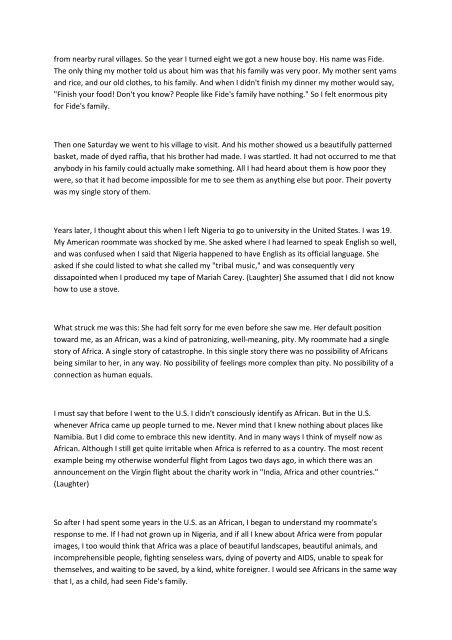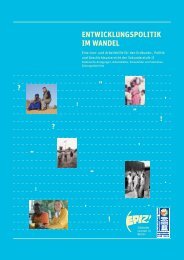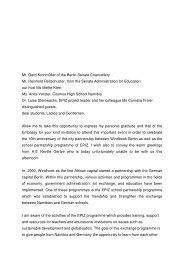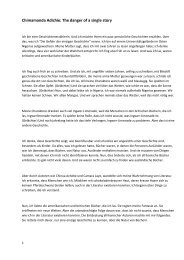Chimamanda Adichie: The danger of a single story
Chimamanda Adichie: The danger of a single story
Chimamanda Adichie: The danger of a single story
Create successful ePaper yourself
Turn your PDF publications into a flip-book with our unique Google optimized e-Paper software.
from nearby rural villages. So the year I turned eight we got a new house boy. His name was Fide.<br />
<strong>The</strong> only thing my mother told us about him was that his family was very poor. My mother sent yams<br />
and rice, and our old clothes, to his family. And when I didn't finish my dinner my mother would say,<br />
"Finish your food! Don't you know? People like Fide's family have nothing." So I felt enormous pity<br />
for Fide's family.<br />
<strong>The</strong>n one Saturday we went to his village to visit. And his mother showed us a beautifully patterned<br />
basket, made <strong>of</strong> dyed raffia, that his brother had made. I was startled. It had not occurred to me that<br />
anybody in his family could actually make something. All I had heard about them is how poor they<br />
were, so that it had become impossible for me to see them as anything else but poor. <strong>The</strong>ir poverty<br />
was my <strong>single</strong> <strong>story</strong> <strong>of</strong> them.<br />
Years later, I thought about this when I left Nigeria to go to university in the United States. I was 19.<br />
My American roommate was shocked by me. She asked where I had learned to speak English so well,<br />
and was confused when I said that Nigeria happened to have English as its <strong>of</strong>ficial language. She<br />
asked if she could listed to what she called my "tribal music," and was consequently very<br />
dissapointed when I produced my tape <strong>of</strong> Mariah Carey. (Laughter) She assumed that I did not know<br />
how to use a stove.<br />
What struck me was this: She had felt sorry for me even before she saw me. Her default position<br />
toward me, as an African, was a kind <strong>of</strong> patronizing, well-meaning, pity. My roommate had a <strong>single</strong><br />
<strong>story</strong> <strong>of</strong> Africa. A <strong>single</strong> <strong>story</strong> <strong>of</strong> catastrophe. In this <strong>single</strong> <strong>story</strong> there was no possibility <strong>of</strong> Africans<br />
being similar to her, in any way. No possibility <strong>of</strong> feelings more complex than pity. No possibility <strong>of</strong> a<br />
connection as human equals.<br />
I must say that before I went to the U.S. I didn't consciously identify as African. But in the U.S.<br />
whenever Africa came up people turned to me. Never mind that I knew nothing about places like<br />
Namibia. But I did come to embrace this new identity. And in many ways I think <strong>of</strong> myself now as<br />
African. Although I still get quite irritable when Africa is referred to as a country. <strong>The</strong> most recent<br />
example being my otherwise wonderful flight from Lagos two days ago, in which there was an<br />
announcement on the Virgin flight about the charity work in "India, Africa and other countries."<br />
(Laughter)<br />
So after I had spent some years in the U.S. as an African, I began to understand my roommate's<br />
response to me. If I had not grown up in Nigeria, and if all I knew about Africa were from popular<br />
images, I too would think that Africa was a place <strong>of</strong> beautiful landscapes, beautiful animals, and<br />
incomprehensible people, fighting senseless wars, dying <strong>of</strong> poverty and AIDS, unable to speak for<br />
themselves, and waiting to be saved, by a kind, white foreigner. I would see Africans in the same way<br />
that I, as a child, had seen Fide's family.
















